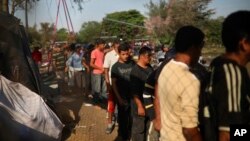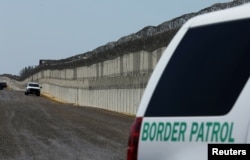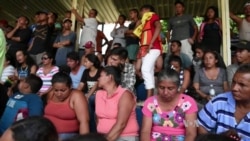U.S. President Donald Trump credited the Mexican legal system Thursday for dispersing a caravan of Central American migrants making its way north through Mexico, with some headed for the U.S., and praised his administration for a dramatic drop in the number of immigrants crossing the southwest border.
Speaking in West Virginia on Thursday at a round-table discussion on tax reform, Trump said, "Mexico has been pretty good. They were very good to us yesterday, because, you know, they had the caravan of thousands of people coming up from Honduras. Thousands of people."
Earlier in the day, Trump issued a tweet:
Mexican officials said the caravan has begun to disperse, but some participants said they were going to continue.
The decision to deploy the U.S. military to the border represents a major new aspect of Trump's wide-ranging immigration crackdown. But major parts of the move are unclear, including how many troops will be sent, when they will deploy and what exactly they will do.
"So we're working out systems now, and we called out the National Guard, and we're doing a real job. I'll tell you what, the laws of this country have to be strengthened and toughened up, because it is crazy," Trump said.
In the U.S., the active duty military is generally restricted from domestic law enforcement functions, which would include apprehending border crossers. However, U.S. presidents have deployed the National Guard to the border to act in support roles.
Trump signed a proclamation authorizing the move Wednesday evening. But states must also approve the decision before deploying their guard members.
Securing the southern border was a centerpiece of Trump's platform during his 2016 campaign for the presidency, and it's something he frequently mentions.
"The Mexican border is very unprotected by our laws," Trump asserted Tuesday. "We don't have laws. We have catch and release. You catch and then you immediately release. And people come back years later for a court case, except they virtually never come back."
On Thursday, he said of the catch-and-release policy, "We're terminating very quickly. We're doing it in pieces."
Trump has continually emphasized the need for a border wall — which on Tuesday he said must be "700 to 800 miles [1,127 to 1,287 kilometers] long." He previously has demanded that Mexico pay for the wall, but he has not emphasized that issue in recent public remarks.
Placating the base
Some see Trump's move to deploy troops as an attempt to placate his base, especially after many conservatives criticized him for recently signing a government funding bill that did not fund the construction of a border wall.
"The most likely explanation for the proposed deployment is politics, just like the previous deployments," said Alex Nowrasteh, an immigration analyst at the CATO Institute.
"Since the members of the caravan intend to surrender to Border Patrol or Customs officers and ask for asylum, the troops serve no purpose. They will not deter asylum seekers," Nowrasteh said.
But the military can play an important role, said Mark Krikorian, who heads the Center for Immigration Studies, a hardline immigration group.
"Where all the military can help is with all kinds of support functions, like transportation, paperwork, reconnaissance — where they actually do the spotting and identification and tell the Border Patrol where to go. That sort of thing," Krikorian said. "There's a lot they can do, but it's not a silver bullet."













